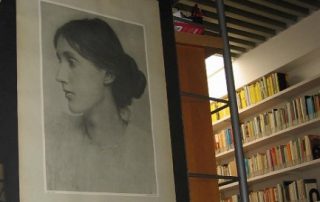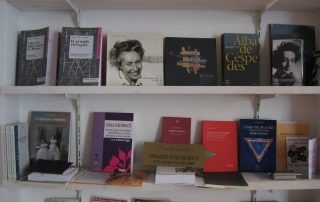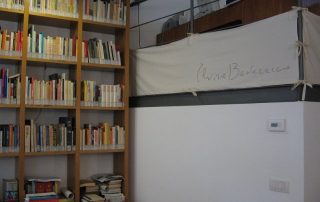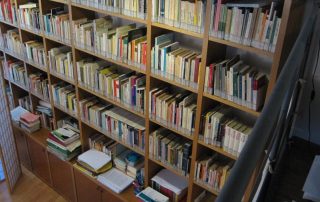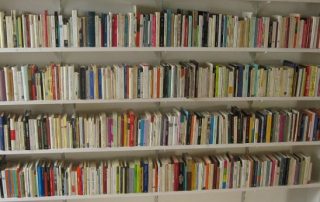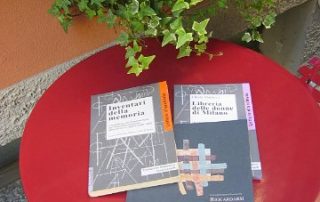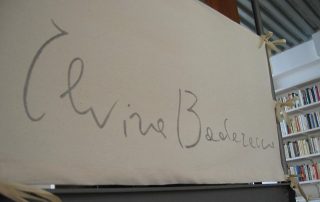About us
The Foundation was established on December 16, 1994 by Annarita Buttafuoco, named in Elvira Badaracco’s will as a life-lasting guardian of her economic, scientific and political legacy.
The purpose of the Foundation is to promote the studies of women’s culture, and women’s social and political experience, with specific attention to women’s historical associations and feminism.
In 1999 Marina Zancan, president of the Badaracco Foundation ever since its establishment, inherits the role of ensurer of the Foundation because of Annarita Buttafuoco’s death.
Governance
Board of Directors: Marina Zancan (president), Maria Canella, Giovanna Rosa, Monica Cristina Storini, Paola Zocchi
Scientific committee: Marina Zancan, Eloisa Betti, Fiorella Imprenti, Lea Melandri, Debora Migliucci, Raffaella Poletti, Francesca Rubini
How we work
The Badaracco Foundation pursues the goals outlined in its Constitution through a variety of activities:
- research in all areas of investigation related to the study of women’s culture and political and social experience of women;
- organization and increase in archival paper and audio as well as managing of a specialized library, starting from the assets donated by the Centre for Historical Studies on women’s liberation movement in Italy, specifically destined to the Foundation;
- development of criteria and methods of treatment and use of archives and libraries;
- the establishment of scholarships and awards in favor of scholars engaged in research fields of interest for the Foundation;
- the development of cultural exchanges with women’s centers, archives and libraries that have similar aims to the Foundation’s, as well as with universities, public and private institutions, associations, national and international institutes;
- agreements with local authorities, ministries, universities and with public and private institutions, both national and international, aimed at the promotion and conduct of research, the establishment, funding and provision of scholarships;
- he organization of conferences, seminars, debates, conferences;
- upgrading/updating classes and training for teachers, archivists, librarians, officials from public service and, in general, women interested in the Foundation’s activities;
- participation in networks and databases of national and international interest;
- publication series within texts studies and materials generated by the Foundation’s activities.
What we do
The Foundation, in continuity with the work of the Centre for Historical Studies on women’s liberation movement in Italy, aims to increase the study of the complex reality of women and to enable further areas of study defined in the planning activities.
In this direction, in addition to increasing the inherited cultural and political heritage, the Foundation recognizes the political opportunity to exploit all forms of women’s intellectual work, reassembling the two elements – political experience and professionalism – which have led to a crisis, in recent years, in the methodological and disciplinary regulations.
At that time the research hypotheses are redefined, as well as the existing structure of political thought; and historiography and the knowledge of the past and present are changed, in order to make women participate in the process of an engaging and relevant redesigning of the future.
National and International collaboration
The Foundation conducts scientific reports in Italy and abroad.
In Italy, the Foundation is in constant relationship of cooperation with all the Documentation Centres of women throughout the country. It holds as well tight bonds with:
- University of Siena, where there is an active area of research on women’s history;
- University of Rome “La Sapienza”, Department of Languages, Linguistics and Literary, which is on a Ph.D. in History of women’s writing, in a consortium with the University of Turin, Bologna and Macerata;
- Milano Bicocca University through the inter-university “Gender Cultures” Research Center.
Abroad, the Foundation had, over years, collaboration and exchange with:
- IIAV International Informatiecentrum en Archief voor de Vrouwenbeweging, Amsterdam;
- Feminist Library and Informative Centre, London;
- CREW Centre de recherche sur les femmes européennes, Bruxelles;
- CLEF, Centre Lyonnais d’études feministes, Lyon;
- ISIS International, Geneva;
- Feministiches Archiv und Dokumentations – Zentrum, Frankfurt;
- Mediterranean Women’s Studies Forum;
- KINFO Center for Interdisciplinary Information on Women’s Studies, Copenaghen;
- UCD Women’s Studies Forum – University College, Dublin;
- Intervengao Feminina, Lisboa;
- Università Autonoma Metropolitana, Mexico City;
- CIHD Centre d’investigaciò historica de la Dona, Universitat de Barcelona;
- Bibliothèque Marguerite Durand, Paris.
Participation in databases
The Foundation is Lombardy regional cluster of the network women’s database Lilith, for automatic research from a gender perspective, documentation and information available in all women’s centers in Italy, about what women write and produce, such as monographs, periodicals, manuscripts, photos, video.
History
Elvira Badaracco was born in Alessandria on May 22, 1911. As a teenager she moved with her parents in Milan where, in 1979, together with Pierrette Coppa founded the Center for Historical Studies on women’s liberation movement in Italy.
At first, the center was hosted by the Feltrinelli Foundation and moved in 1991 at the National Women’s Union, historical gathering center of Milanese women. On 12 November 2009, the Foundation opened its new office premises at Via Menabrea 13 – Milan.
The development of the Centre and its consolidation – especially due to the dedication of Elvira Badaracco herself, who had the capacity to coordinate a national secretariat composed of scholars from different backgrounds and expertise – have confirmed her belief that it was necessary to ensure this institution of research and study a solid future, including the transformation of its institutional form.
This conviction is expressed by Elvira Badaracco in her will, written in April 1993, where she states that the center of historical studies on women’s liberation movement in Italy should become a Foundation with similar objectives to those of the Centre, but with greater prospects development and strengthening, protected in part by the income of a property she left to the Foundation.
Elvira Badaracco died in Milan on 21 January 1994 and in December 1994 was formally established by Annarita Buttafuoco the appointment status of the Foundation, as Badaracco herself had stated in her will, which also guaranteed a lifetime of economic, political and scientifical assets.
As Annarita Buttafuoco died, in 1999, this operative function was transferred to Marina Zancan, president of the Foundation ever since its establishment.


